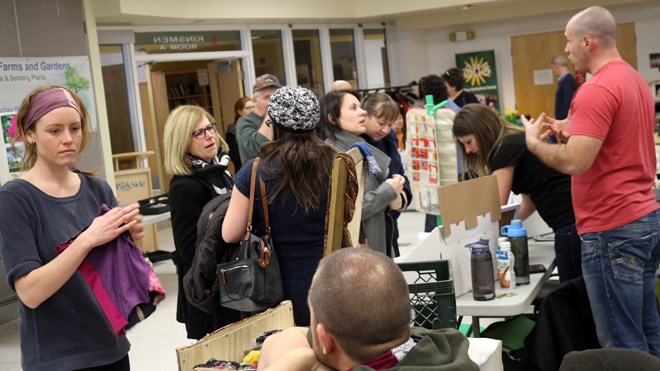Logically enough, a one-day event dedicated to growing your own food itself keeps growing.
The seventh edition of Seedy Sunday, put on by the Sudbury Horticultural Society and its partners, attracted record crowds, with about 1,200 people passing through the Parkside Centre on, you guessed it, Sunday.
Master gardeners were on hand to give formal talks and answer all the 'seedy' questions people had about farming. Organizer Stuart McCall, of McGrow Farms, said at least part of the popularity of Seedy Sunday is it reminds people that spring is near.
"People are fed up with winter," McCall said. "And they come here because they know everyone here is like-minded, which is really cool. This is our seventh event, and every year it just keeps getting bigger and bigger and bigger. Last year we had around 800 people, I would say we're at 1,200 to 1,400 this year."
There's a growing awareness, McCall said, about the importance of eating food not only grown closer to home, but that's less processed and healthier for families.
Jacob Kearey-Moreland, a guest speaker at the event who talked about the importance of seed libraries, said it's a global issue that is becoming more top-of-mind for communities.
"In particular food sovereignty — knowing where your food comes from," Kearey-Moreland said.
Food system challenges
Problems with the food system contributes in less obvious ways to social problems, he said, such as processed foods leading to obesity and disease.
"Processed food is highly manufactured, and so farmers are growing commodities for processing into all kinds of junk foods and packaged foods that are low in nutrients,” he said. “So people think they're getting a good deal and that it's convenient. But they're paying way more for a lot less nutrients."
Salt and sugar added to a lot of processed foods, he said, which can actually make people sick.
"And they become addicted to it and it's harmful to them."
That's why Canada is considering a tax on pop and other sugary drinks, similar to cigarette taxes.
That's an issue that irks McCall, who said food that is visually unattractive tastes just as good and is just as healthy as not-so-funny looking fruits or vegetables.
"What do you do when you go to the grocery store to buy a (carrot)?” McCall said. “You want the nicest looking one, right? (But) a grade 3 carrot is perfectly edible, it just doesn't look as nice as a grade 1 carrot."
So attitudes of consumers need to change to stop the waste, and ugly food should be sold at a discount, he said.
Growing farmers
To encourage local food production, McCall said government needs to find ways to encourage young people to consider farming. That's especially important because most farmers in Canada are older than 55.
"So we're losing a lot of farmers," he said.
He'd like to see paid internships for young farmers, so they can experience farm life first hand.
"So they can get experience and learn how to become a farmer, directly from a farmer in his field," he said.
Closer to home, McCall's part of the group running The Market, Sudbury's farmers market. They convinced city council to cut vendor rental prices at The Market in half this year, in an effort to attract more vendors and offer a bigger variety of products.
"It should bring in more vendors,” he said. “Last year, we only had 35 vendors in the whole market. And most were resellers — they buy products in southwestern Ontario."
Rather than growing their own food, they put it on a truck and bring it North.
"That is not farming,” he said. “That is not local food production. That is not what a local farmers market is supposed to be all about. It's supposed to be about local farms, about food produced close to home."
He's hoping the reduced rates will attract more local farmers — especially the ones just starting out.
"Then young farmers can go to our farmers market, sell their products at a good price, make a bit of money," McCall said. "That would encourage them to become a farmer because they're able to do that. And we need to make people more aware of where local food is grown."
The group is also working with the city to see whether changing bylaws could make it easier for local farmers to thrive.
"For instance, the sign bylaw right now means we cannot put a sign up at the end of the road indicating to people they can buy food at my farm,” he said. “Why not? If you had that sign there, people would know where to go. They would rather buy from me ... because they know me, they know they're getting it fresh, they know they're getting it local, they know they're getting it organic — and they're getting it at a pretty good price."
